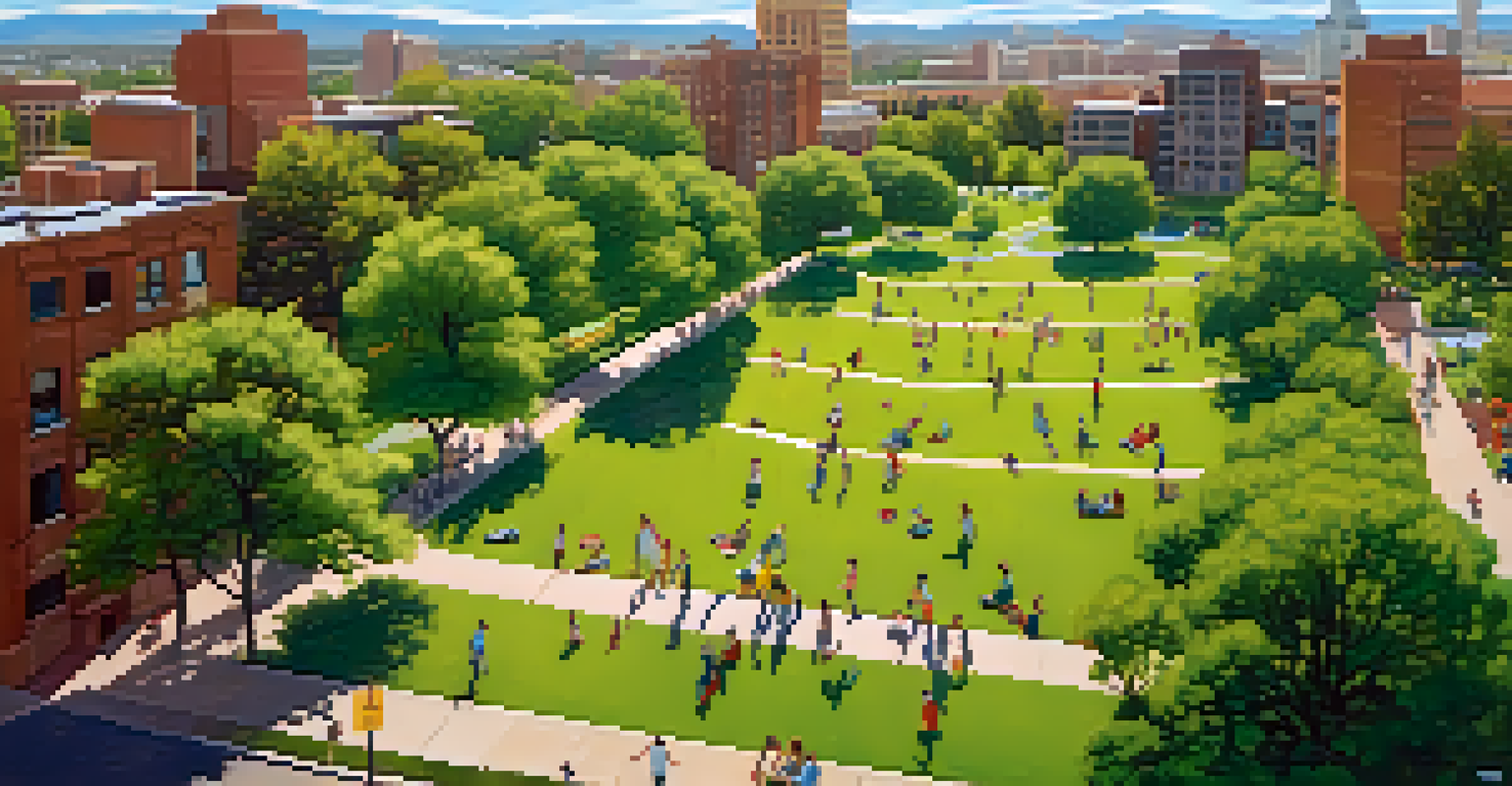Environmental Justice: A Focus of Denver's Advocacy

Understanding Environmental Justice and Its Importance
Environmental justice is the fair treatment of all people, regardless of race or income, when it comes to environmental laws and policies. It emphasizes that everyone deserves a healthy environment, which is essential for overall well-being. In places like Denver, where urban development and environmental concerns often clash, understanding this concept is crucial for equitable living.
Environmental justice is not a separate issue; it is a fundamental part of the larger struggle for justice.
The roots of environmental justice can be traced back to the civil rights movement, highlighting how marginalized communities often bear the brunt of environmental hazards. For instance, low-income neighborhoods may be more exposed to pollution from factories or waste disposal sites. This historical context brings to light the pressing need for advocacy focused on these vulnerable populations.
In Denver, environmental justice isn't just a buzzword; it's a driving force behind many community initiatives. By addressing these disparities, the city aims to create a more sustainable future that benefits everyone, ensuring that no group is left behind.
Denver's Advocacy Landscape: Key Players and Initiatives
Denver's commitment to environmental justice involves numerous stakeholders, including local government, non-profits, and community groups. These players collaborate to identify and address disparities faced by marginalized communities. This collective effort is crucial in pushing for policies that prioritize health and equity.

One notable initiative is the Denver Environmental Justice Advisory Council, which serves as a platform for community voices to be heard in policy discussions. This council focuses on making recommendations that influence city planning and resource allocation. By engaging with residents directly, they ensure that local needs and concerns are prioritized.
Environmental Justice Explained
Environmental justice ensures fair treatment for all, advocating for healthy living conditions, especially in marginalized communities.
Additionally, various non-profit organizations work tirelessly to raise awareness and promote educational programs. They often host workshops and events that empower community members to advocate for their rights, creating a grassroots movement that further strengthens Denver’s environmental justice goals.
Community Engagement: The Heart of Denver's Efforts
Community engagement plays a pivotal role in advancing environmental justice in Denver. Local residents are encouraged to participate in discussions about environmental policies that affect their lives. This participatory approach fosters a sense of ownership and responsibility among community members.
The environment is where we all meet; where we all have a mutual interest; it is the one thing all of us share.
For example, various neighborhood organizations hold regular meetings and forums, providing a space for residents to share their experiences and concerns. These gatherings not only educate participants but also create a network of support and solidarity. When people come together to advocate for their rights, they amplify their voices.
Moreover, community-driven initiatives often lead to innovative solutions tailored to the unique needs of each neighborhood. Whether it’s establishing community gardens or organizing clean-up events, these grassroots efforts empower residents to take actionable steps towards a healthier environment.
Addressing Air Quality Challenges in Denver
Air quality is a significant concern in Denver, particularly for low-income and marginalized communities. These areas often experience higher levels of pollution due to their proximity to industrial sites and heavy traffic. Understanding the link between air quality and public health is essential for effective advocacy.
Local advocacy groups have been at the forefront of raising awareness about air pollution's impact on health. They provide valuable resources and information to help residents understand their rights and how to address air quality issues. This educational component is vital for empowering communities to demand better environmental protections.
Community Engagement is Key
Active participation from residents in environmental discussions fosters a sense of ownership and leads to innovative solutions.
In response, the city has implemented various measures to improve air quality, such as promoting public transportation and increasing green spaces. These initiatives not only aim to reduce pollution but also enhance the overall quality of life for all Denver residents.
Water Access and Quality: A Critical Focus
Access to clean and safe drinking water is a fundamental right that many communities in Denver still struggle with. Issues such as lead contamination and aging infrastructure disproportionately affect low-income neighborhoods. Ensuring equitable access to water is a key component of environmental justice.
Local advocacy groups have been instrumental in addressing these water quality concerns. They work with residents to raise awareness about the importance of safe drinking water and facilitate access to resources for testing and remediation. This proactive approach empowers communities to take control of their water quality issues.
Furthermore, the city is taking steps to improve water infrastructure and ensure that all residents have access to safe drinking water. By prioritizing these efforts, Denver aims to eliminate disparities and promote health equity across its diverse communities.
Green Spaces and Urban Development: Bridging the Gap
Green spaces play a vital role in enhancing community well-being and environmental health. However, access to parks and recreational areas is often inequitable, particularly in lower-income neighborhoods. Advocating for more green spaces is an essential aspect of environmental justice in Denver.
Community organizations are actively pushing for the development of parks and green areas in underserved neighborhoods. These initiatives not only provide recreational opportunities but also improve air quality and promote biodiversity. When communities have access to green spaces, they can foster a stronger sense of connection and belonging.
Addressing Air and Water Quality
Improving air and water quality is crucial for public health, particularly for low-income neighborhoods disproportionately affected by pollution.
In response to these advocacy efforts, the city has begun to prioritize equitable access to green spaces in its urban planning policies. By incorporating community input into development plans, Denver is working towards creating inclusive spaces that benefit all residents.
The Future of Environmental Justice in Denver
As Denver continues to grow and evolve, the fight for environmental justice remains at the forefront of community advocacy. The challenges may be significant, but the collective efforts of residents, organizations, and local government are paving the way for positive change. There is a sense of hope and determination that fuels this movement.
Looking ahead, it’s crucial for Denver to maintain momentum and reinforce its commitment to environmental justice. Continued engagement with communities and responsive policies will be key to addressing ongoing disparities. As more residents become aware of their rights and advocate for equitable solutions, the movement will only gain strength.

Ultimately, the journey towards environmental justice in Denver is about creating a city where everyone can thrive. By prioritizing equity and sustainability, Denver can set a powerful example for other cities grappling with similar challenges, proving that together, change is possible.